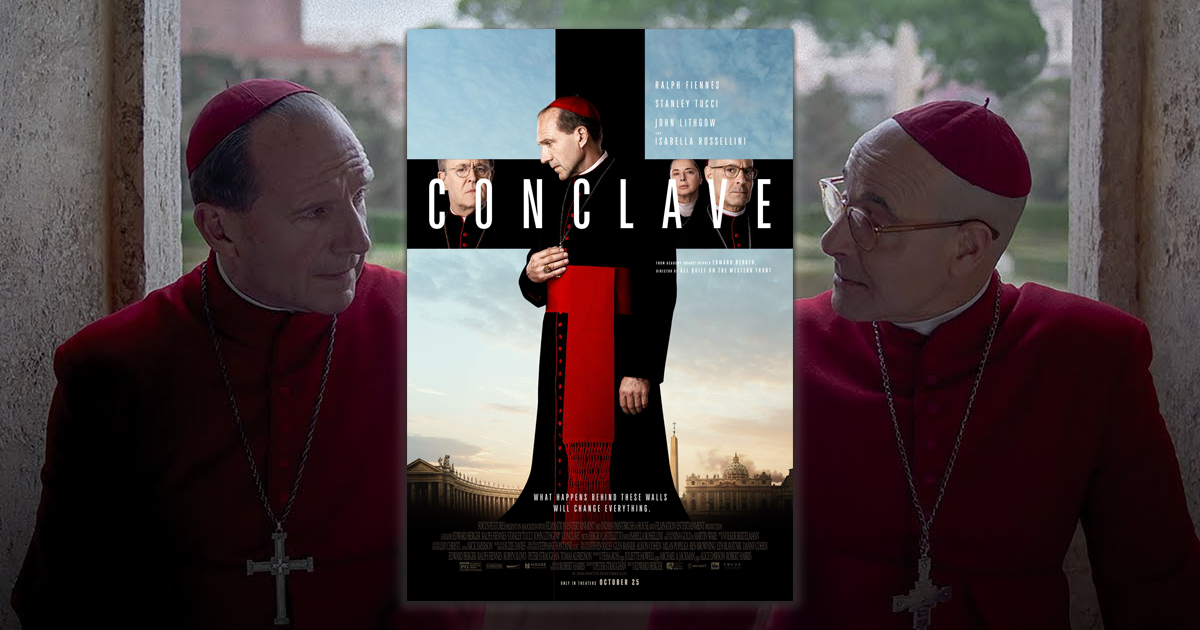I’m not a religious or faith-driven person. In both my personal and professional life, I rely on science, logic, and reason to justify what needs justification, but when it comes to cinema and television, everything fascinates me. Consequently, a mystery-thriller centered on the election of a new Pope after the previous one’s death becomes extremely compelling, especially when paired with a star-studded cast led by Ralph Fiennes (The Menu) and a renowned director like Edward Berger (All Quiet on the Western Front).
Cardinal Thomas Lawrence (Fiennes) is tasked with organizing the papal conclave, giving the work its title, Conclave. Adapted from Robert Harris’ novel of the same name by screenwriter Peter Straughan (The Goldfinch), the story unfolds as the most powerful leaders of the Catholic Church gather behind the walls of the Vatican. As the election progresses, Lawrence uncovers deep secrets left in the wake of the Pope’s death – secrets that could shake the very foundation of the Church.
Conclave exceeded all my personal expectations, which were already moderately high. Straughan’s narrative will catch many “skeptics” off guard. After all, could a papal election really deliver such tension, suspense, mystery, and character development that leaves a lasting impact on the audience? When extraordinarily talented artists collaborate across every filmmaking department, the answer is a resounding “yes.”
Many will describe Conclave as “intelligent entertainment” due to the natural, unforced manner in which Straughan’s screenplay is executed by Berger and elevated by Fiennes and the cast. The movie challenges viewers with a thought-provoking exploration of corruption – whether systemic, institutional, or personal. It delves into crises of faith in God, the Church, or even oneself while offering a raw, sometimes shocking perspective on the insidious presence of politics within the Vatican.
Over its two-hour runtime, Conclave sheds light on papal laws and the election process of the Catholic Church’s “supreme leader,” offering eye-opening moments for an audience potentially naive to its complexities. Those envisioning an honest process free of prejudice, discrimination, political machinations, or selfish ambition will find Berger’s film both provocative and profoundly meticulous. Among the many impactful dialogues, one stayed with me – I’ll be paraphrasing here:
“Serving an ideal doesn’t mean we must be ideal, as this is impossible for mere humans. If a new Pope is meant to be the ‘ideal candidate,’ no mortal could ever fill the role.”
When appointing someone to a position of ultimate authority – whether within a home, workplace, or global stage – the goal should be to find a representative who embodies the institution’s principles. Herein lies one of Conclave‘s key conflicts: the differing viewpoints among cardinals on issues like other religions, sexual orientation, cultural origins, and many other critical topics.
Volker Bertelmann’s score – marking another collaboration with Berger – is the movie’s standout technical feature. Its pulsating background music creates an overwhelmingly tense atmosphere, never letting the audience feel fully at ease. Berger’s firm direction adds yet another masterclass in framing, with stunning, immersive interior shots that contrast the Vatican’s darkness with the vivid colors of religious attire – a testament to Stéphane Fontaine’s (Captain Fantastic) impeccable cinematography.
The thematic richness culminates in a brilliant conclusion that leaves the viewers questioning their own capacity for tolerance and respect for differences – be it in opinion, religion, origin, gender, sexual orientation, or more. While Conclave may seem clear about what the Church should stand for, the final moments catch even its protagonist off guard, casting doubt and leaving the audience questioning their morals.
The character work is as rich as the narrative itself. Conclave offers unique perspectives, and whenever someone seems like the obvious choice, a revelation about their ideas or past rewinds the clock, reinforcing the notion that perfection is unattainable. At first, Lawrence has clear opinions on who should or shouldn’t be considered for the role, but as the story unfolds, even his ambitions shift, mirroring the widespread uncertainty within the Church.
And then we come to the phenomenal cast, which elevates an already award-worthy film. Ralph Fiennes delivers an unforgettable lead performance, balancing assertive moments in front of archbishops and cardinals with intimate, emotional scenes, often alone. Fiennes’ portrayal exemplifies what many describe as a “commanding display”.
Stanley Tucci (Spotlight) offers a far more complex performance than it initially appears, as his role as Cardinal Aldo Bellini demands emotional depth while maintaining an air of serene composure. Sergio Castellitto (Romeo Is Juliet) makes good work as a more traditionalist candidate, and John Lithgow (Killers of the Flower Moon) – well, he’s John Lithgow. Many other actors deserve praise, but it’s the ensemble interactions that make Conclave one of the year’s standout movies.
Final Thoughts on Conclave
Conclave surpasses expectations for a mystery-thriller set in the Vatican’s inner sanctum. It’s a focused exploration of characters shaped by religious convictions and personal ambitions, offering a fascinating reflection on morality, faith, and power. Edward Berger’s technically flawless direction guides a brilliant cast through a narrative that never underestimates the viewer’s intelligence. Peter Straughan’s screenplay tackles universal themes of corruption and idealism with rare sensitivity, balancing narrative tension with emotional depth. With Ralph Fiennes’ magnetic performance, Volker Bertelmann’s gripping score, and Stéphane Fontaine’s immersive cinematography, Conclave stands as one of the most captivating films of the year.
Rating: A
Conclave is now playing in theaters.
Learn more about the film, including how to buy tickets, at the official website for the title.
You might also like…


